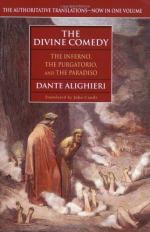Upon the chariot’s right edge still she stood,
Immovable, and thus address’d her words
To those bright semblances with pity touch’d:
“Ye in th’ eternal day your vigils keep,
So that nor night nor slumber, with close stealth,
Conveys from you a single step in all
The goings on of life: thence with more heed
I shape mine answer, for his ear intended,
Who there stands weeping, that the sorrow now
May equal the transgression. Not alone
Through operation of the mighty orbs,
That mark each seed to some predestin’d aim,
As with aspect or fortunate or ill
The constellations meet, but through benign
Largess of heav’nly graces, which rain down
From such a height, as mocks our vision, this man
Was in the freshness of his being, such,
So gifted virtually, that in him
All better habits wond’rously had thriv’d.
The more of kindly strength is in the soil,
So much doth evil seed and lack of culture
Mar it the more, and make it run to wildness.
These looks sometime upheld him; for I show’d
My youthful eyes, and led him by their light
In upright walking. Soon as I had reach’d
The threshold of my second age, and chang’d
My mortal for immortal, then he left me,
And gave himself to others. When from flesh
To spirit I had risen, and increase
Of beauty and of virtue circled me,
I was less dear to him, and valued less.
His steps were turn’d into deceitful ways,
Following false images of good, that make
No promise perfect. Nor avail’d me aught
To sue for inspirations, with the which,
I, both in dreams of night, and otherwise,
Did call him back; of them so little reck’d
him,
Such depth he fell, that all device was short
Of his preserving, save that he should view
The children of perdition. To this end
I visited the purlieus of the dead:
And one, who hath conducted him thus high,
Receiv’d my supplications urg’d with weeping.
It were a breaking of God’s high decree,
If Lethe should be past, and such food tasted
Without the cost of some repentant tear.”
CANTO XXXI
“O Thou!” her words she thus without
delay
Resuming, turn’d their point on me, to whom
They but with lateral edge seem’d harsh before,
“Say thou, who stand’st beyond the holy
stream,
If this be true. A charge so grievous needs
Thine own avowal.” On my faculty
Such strange amazement hung, the voice expir’d
Imperfect, ere its organs gave it birth.
A little space refraining, then she spake:
“What dost thou muse on? Answer me.
The wave
On thy remembrances of evil yet
Hath done no injury.” A mingled sense
Of fear and of confusion, from my lips
Did such a “Yea” produce, as needed help
Of vision to interpret. As when breaks
In act to be discharg’d, a cross-bow bent
Beyond its pitch, both nerve and bow o’erstretch’d,




